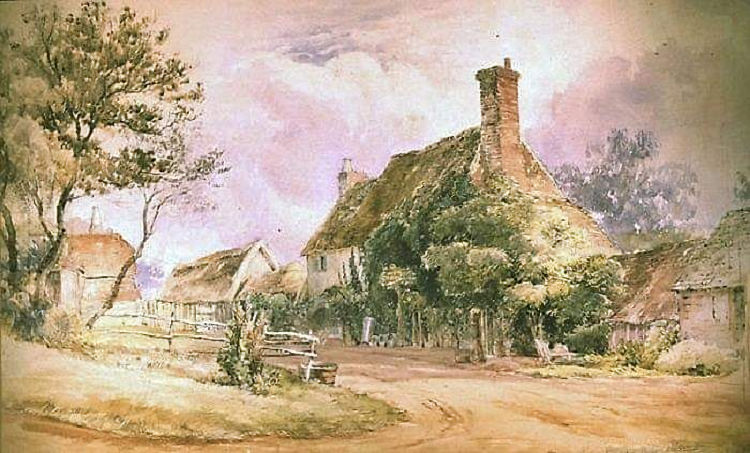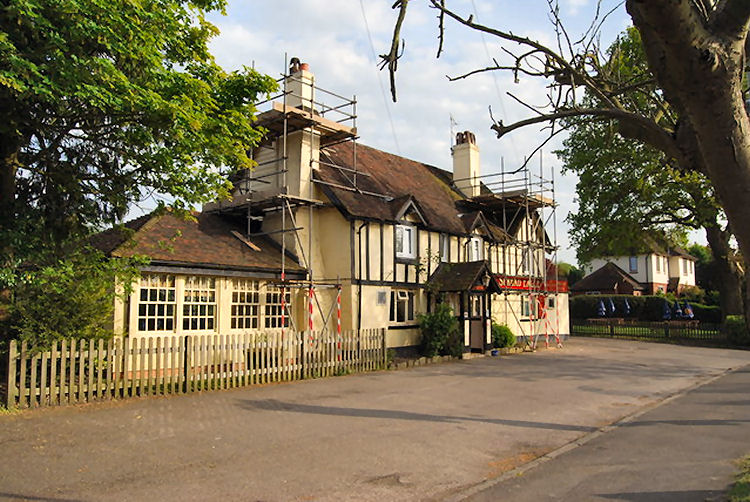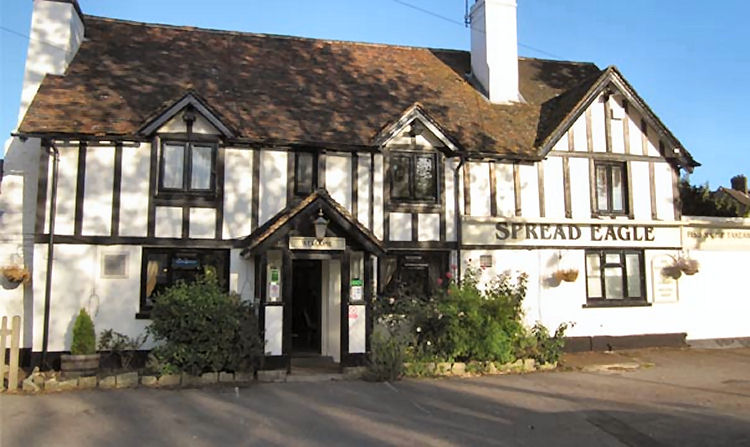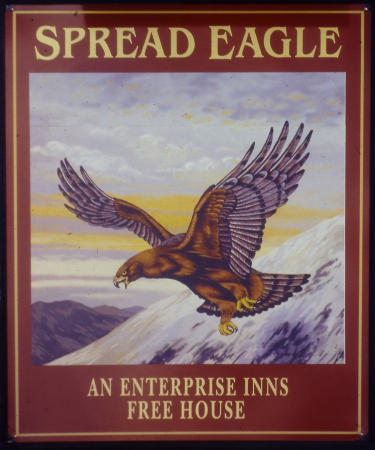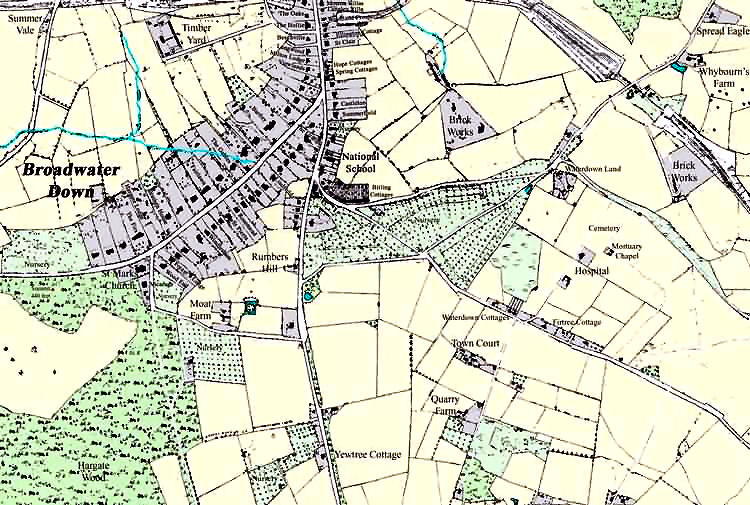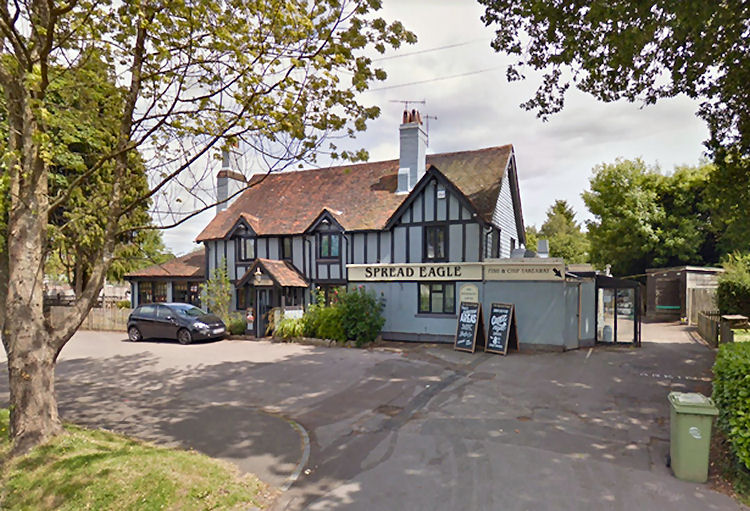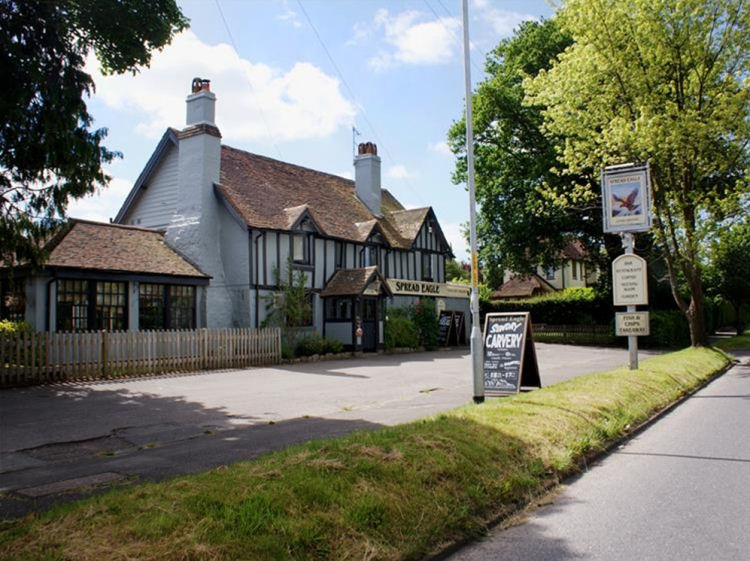|
Kent & Sussex Courier, Wednesday 18 June 1879.
A Licensing Case.
Henry Funnell, of the “Spread Eagle,” was summoned for keeping open his
licensed premises for the sale of intoxicating liquors on Sunday, the
8th of June.
Mr. W. C. Cripps appeared for the defence, and apologised for the
absence of the defendant, who was represented by Mrs Funnell. He pleaded
not guilty.
Sergt. Waghorne, K.C.C., said that on Sunday, the 8th inst, at 3.45 in
the afternoon, he, in company with I.C. Eaglestone, visited the "Spread
Eagle," kept by the defendant. They were in plain clothes at the time.
On going to the back door he saw outside four men. He pushed by them and
went into the house. He there saw three other man, named Cowens, Barnes,
and Hollands. Mrs. Funnell was coming from the cellar with a glass of
ale in her hand. The cellar was on the ground floor. As soon as he and
Eaglestone got inside the house, Mrs. Funnell said, "I cannot have
so
many of you here at one time. Some of you had better go out in the
garden for a while. I’ll serve you all presently. If we have too many in
we shall have some one along presently, and we shall all get into
trouble.” He (witness) immediately said, "What do you mean by
this—keeping your house open in this manner?” He at the same time
ordered the back door to he closed. Mrs. Funnell said, "Don't shut the
door," She opened the door and waved her hand to the men outside, who
immediately left He then proceeded to take the names of the men in the
house. After he had taken Barnes’ name Mrs. Funnell looked at Barnes and
said, "Yon came to see my husband about a horse. You had better see him
before you go away.” He then took the names of the other persons, and
went outside, when Hollands said "Oh, I've come to see about a horse
too." After Mr. Cowens had left he asked her to account for his
presence, when Mrs. Funnell said he drove up in a trap, and she had been
told she could draw to all persons driving up in a trap. He told her
that was wrong, and then she said that she had supplied him with a glass
of ale and bottle of ginger beer, for which he had paid. When he first
went into the house Barnes had a shilling in his hand, and asked Mrs
Funnell to serve him with two cigars. One of the men outside had
sixpence in his hand, and when witness made himself known this man
pulled out a railway ticket. Mr. Funnell, who was upstairs, came down,
and witness told him what he had seen. Defendant said he was not aware
his house was open, and wished him (witness) not to take any notice of
it this time. Before going to the house he saw in half an hour six or
seven men go to the back door, and go away again after four or five
minutes had elapsed.
By Mr. Cripps:- Had heard that a funeral was going on that afternoon at
the Cemetery, but he could not say it was of a respected railway
official. He saw none of the funeral party that afternoon, only pleasure
takers. Found three men inside the house. Barnes had a shilling in his
hand. Had heard that two of the people in the house were there about the
sale of a horse. He could not say how far Mr. Cowens had travelled that
day, but that did not matter.
Mr Cripps:- Don't let us have policeman's law, I am going to argue that
presently. Mr. Cowens, I suppose, gave you his name?
"Witness:- He said his name was George Cowens, but I find it is George
F. Cowens.
Mr. Cripps:- Oh indeed, he forgot to put the “F” in.
I.C, Eaglestone corroborated. When he served the summons on Mrs. Funnell,
she said she was very sorry for what had taken place, and hoped it would
not occur again, but she supposed she could get off by paying.
Mr Cripps, in addressing the Bench for the defence, said that before
proceeding to argue the case he should like to call their worships
attention to a case decided by them some time ago when they convicted a
fly proprietor, of Groombridge, and the landlord of the "Bald Faced
Stag," Ashurst, the latter for keeping open his home during prohibited
hours, and the former for being on the premises. He was at the time of
opinion the magistrates were wrong in convicting, because the man had
put up at the house, but he had since found a precisely similar case
which showed that their worships were right. With regard to the present
case he remarked that the difficulty he had to contend with was the most
unfair and improper way statements had been made with a view to ensure a
conviction and prejudice the Bench. If these sort of inferential
statements were to be allowed to be imported into a serious case of this
description he did not know where it would end. The man might have had a
shilling in his hand for some lawful purpose, he might have been going
to Hawkenbury Church and intended it for the missionary box. It did not
fellow that ha was going to spend it in beer. He did not see anything
very unlawful even in several young man being seen in the neighbourhood
of a public-house on a Sunday afternoon, in a beautiful neighbourhood,
for it had been held by the most eminent judge that one of the most
reasonable occupations was to go out and have a pleasant walk, and until
the last Licensing Act they were allowed to have reasonable refreshment.
He must ask their worships to dismiss from their minds all sorts of
inferences with which the police wished to prejudice their minds. When
the constable was asked whether one of the defendants had not given his
right name, he replied, to prejudice the Bench, that he left out the "
F." It was a disgrace, and he said it emphatically, for a police
constable to come forward and ask a Bench of their experience to have a
prejudice and undue influence against the defendant in that sort of way.
He believed when they had heard the evidence on the other side they
would really not believe what the police constables had said if they
would dismiss from their minds all these inferences. Two of the men in
the house were there for the purpose of inquiring about a horse. That
they had a glass of ale given them he was going to admit, and they had a
perfect right to be there for any lawful business. Mr. Cowens was a
tradesman of the town. He had taken his wife and family out for a drive,
and returning home one of the children wanted something to drink. They
pulled up at the "Spread Eagle," where they had a bottle of ginger beer
and a glass of ale—not a very unreasonable thing for a man to do. The
question was did he do that which was unlawful. He submitted that if
Mr. Cowens had travelled three miles, as he undoubtedly had done, he was
entitled to reasonable refreshment, and in that opinion he was fortified
by the opinion of Patterson, who had written a work on licensing.
Mrs. Martha Funnell, wife of the defendant, said there was no doubt when
the constable called there were three men in the house. Barnes and
Hollands called about a horse which my husband had for sale. The horse
was sent away the next morning in consequence of the visit. She gave
them a glass of beer and was going to send them away without seeing her
husband who was ill upstairs. They did not pay anything. Mr. Cowens,
whom she did not know, came up in a fly to the front door, and had a
bottle of ginger beer and a glass of ale, which he paid for; she thought
he was a traveller. There were some children and a lady in the fly. She
served no one at the back door, and Mr. Cowens was the only person from
when she had received any money.
By Supt. Barnes:- Did not ask Mr. Cowens whether he was a traveller.
Benjamin Barnes, coachman to a gentleman of Tunbridge Wells, said he
went to the "Spread Eagle" on the afternoon of Sunday, the 8th inst to
ask Mr. Funnell to allow a young man (Charles Hollands) to show a horse
to his master the following morning. Mrs. Funnell gave him a glass of
ale. He had no shilling in his hand, only a sixpence. Ha asked Mrs.
Funnell for two cigars, and she refused to serve him.
Mr. George Fisher Cowens said he carried on business in Tunbridge Wells,
within a mile of the "Spread Eagle." On the Sunday afternoon in question
he, his wife and children went out for a walk, but his wife being unable
to walk they want for a two hours' drive. On the way back one of the
children said it wanted something to drink, so he ordered the cabman to
pull up at the "Spread Eagle." He had a bottle of ginger beer and
afterwards a glass of ale believing he had a right to it. He did not
want the ale, as he was not then far away from home, where he had
plenty, but believing that he was entitled to refreshment, he had the
glass of ale, because he had troubled the landlady to open her house to
supply him with a bottle of ginger beer.
Mr. Cripps said his contention was that having travelled more than three
miles that afternoon, and not for the express purpose of tippling, Mr.
Cowens was entitled to refreshment, and that Mrs. Funnell, although she
had not asked him if he was a traveller, she believed him to be one, and
that the actual question was not necessary.
Mr. Simpson (Magistrates' Clerk) said he thought the law was very clear
that the man must be three miles from his abode at the time to make him
a bona fide traveller.
The Bench said they considered the case proved, and asked Supt. Barnes
what he knew about the house.
Supt. Barnes said they had received repeated complaint of Sunday
trading, and that was the cause of the sergeant being in plain clothes.
Mr. Cripps considered that convictions only should be stated. Their
worship had laid down a sensible rule, which he was sorry some of the
Benches in the neighbourhood ignored, that they would only take into
consideration convictions, and not complaints.
The Chairman said that in considering what the fine should be, they
were bound to consider the character of the house.
Mr. Cripps said the Licensing Act required everything to be given on
oath.
The Bench fined the defendant £1, and 13s. costs.
Mr. Cripps said the defendant had evidentially made a mistake ignorantly,
and he asked that the license should not be endorsed.
The Bench said they would not order the license to be endorsed.
George Fisher Cowens, Benjamin Barnes, and Charles Hollands were
summoned for being on the licensed premises at the time.
Mr Cripps appeared for the defendants. Ha pleaded guilty on behalf of
Mr. Cowens, and not guilty to the others.
Sergeant Waghorne said he had forgotten to add that Mrs. Funnell, when
she brought the glass of beer from the caller, said, “Who is this for?”
Hollands said it was for him, and drank it.
I.C. Eaglestone also corroborated this statement. He did not see him pay
for it.
Mr. Cripps commented strongly on the fact of the constable forgetting
such an important part of their case, and said he could not find words
sufficiently strong in reprehension of such conduct.
Mrs. Funnell denied that she sold any ale to Hollands. She might have
used the words imputed to her by the police, but she did not believe she
did. Barnes told her he had brought a young man with him, and she did
not know him.
Mr. Cripps said Hollands could corroborate that statement.
Mr. Browell said he did not think it was necessary.
The Bench fined Hollands and Cowens 10s. each and costs.
Mr. Cripps said he should appeal against the fine on Hollands.
The Chairman said the Bench wished him to state that the police were
only doing their duty in every respect, and that the remarks made
against them were not justified.
|
